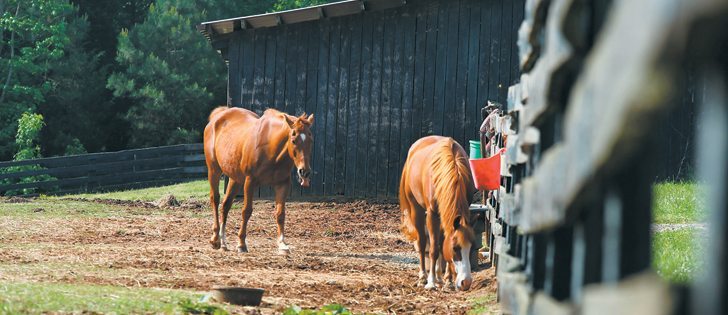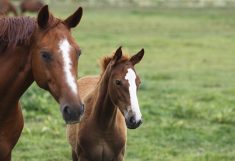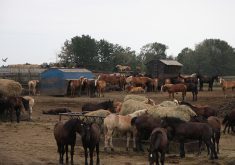Tetanus tops recommended vaccines | A drop in vaccinations for West Nile Virus increases danger of epidemic, warns expert
Spring vaccination appointments for horses are one of Dr. Ashley Whitehead’s favourite times.
It’s a quiet chance to look over a horse, chat with the owner about problems and do a physical examination as part of a preventive medicine package.
“We’re not dealing with fire en-gine medicine,” said Whitehead, an instructor in large animal internal medicine at the University of Calgary’s Faculty of Veterinary Medicine.
Whitehead’s approach to equine vaccinations is not cast in stone. What the veterinarian recommends for a performance horse is different than what she recommends for a horse that stands in the pasture year round.
Read Also

Beef check-off collection system aligns across the country
A single and aligned check-off collection system based on where producers live makes the system equal said Chad Ross, Saskatchewan Cattle Association chair.
“There is really no one size fits all.”
Whitehead said the American Association of Equine Practitioners breaks vaccines into two groups: core vaccines that it suggests all horses receive and non-core vaccines that may be recommended, depending on the horse’s activity.
In Western Canada, the core vaccines are tetanus, eastern and western equine encephalitis and West Nile Virus. In Eastern Canada, the rabies vaccine is added to the core vaccines.
Tetanus is the No. 1 recommended vaccine because horses are exposed to a lot of opportunities to get tetanus through cuts, scratches and punctures.
“Every single horse should get it every single year,” said Whitehead.
The next most recommended vaccines are for mosquito-borne diseases such as West Nile Virus and eastern and western equine encephalitis.
Whitehead is concerned there has been a drop in vaccinating for West Nile Virus, especially since the outbreak in 2001, because horse owners believe the danger of another epidemic is past.
She said fewer people choosing to vaccinate for West Nile Virus makes it more likely there are fewer antibodies in horses and therefore less protection against the virus in the horse population.
It’s a serious disease that can cause death or lasting damage to a horse. Whitehead said fewer people vaccinating against West Nile increases the likelihood that the virus will spread.
Vaccines for eastern and western equine encephalitis always come as a pair and should be also given annually, she added.
Whitehead recommended vaccinating for all mosquito-borne diseases before mosquito season to allow horses time to build up antibodies against the disease.
The rabies vaccine isn’t given often on the Prairies because of the low prevalence of the disease. However, horses travelling to Ontario should be given a rabies vaccine.
The non-core vaccines vary de-pending on the activity of the horse, she said.
The most common non-core vaccine is to protect against equine herpes, which can cause respiratory disease and abortion. It is most common in young horses.
The equine influenza virus also affects young horses and is one of the most common infectious diseases of the respiratory system. Whitehead recommended giving the vaccine if horses are mingling at barns, trail rides or horse shows.
Strangles is a highly contagious disease that causes horses to have swollen lymph nodes. Whitehead said it is possible for horses to get the disease even after being vaccinated.
“The vaccine reduces the likelihood of the disease,” said Whitehead.
Some horse owners vaccinate twice a year, especially for respiratory tract infections, depending on the area and the contact with other horses. There is no reliable data on how long vaccines last, but they all work to boost immunity in the animal.
“Vaccination definitely helps the prevention of disease.”








![Conservative agriculture critic and Alberta Foothills MP John Barlow said some [people who raise horses for the overseas meat market] were harassed and bullied and wanted no part of the study, even though they could lose their livelihood if the bill is passed. | File photo](https://static.producer.com/wp-content/uploads/2024/04/30150023/03-BJM121610horse-feedlot-235x165.jpg)








